The Thai female chef who’s charting a new course for Bangkok’s Nahm
In Asia, we should value what we have before it’s too late, says Chef Pim, who took over from David Thompson last year. Oh, and Thai food is so much more than pad Thai and tom yam soup.
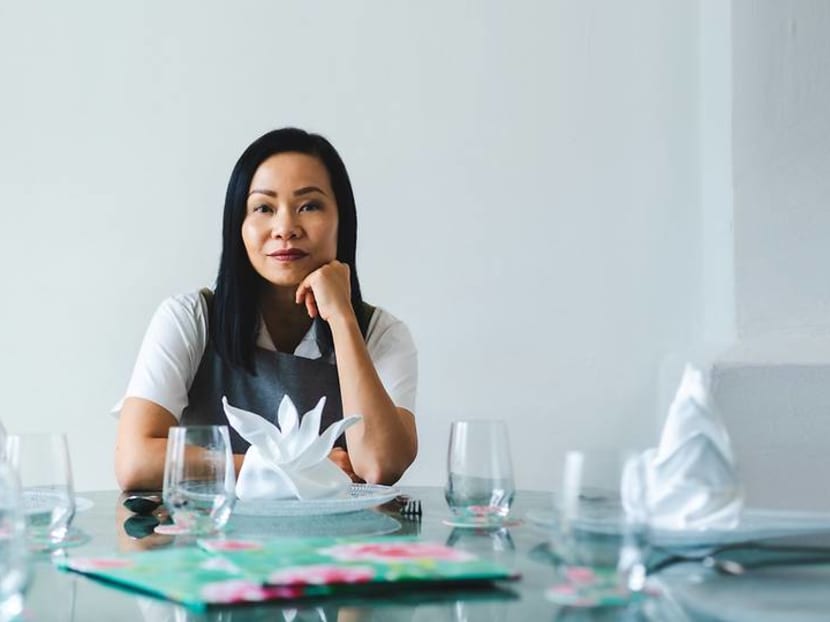
(Photo: Alvin Teo)
“Part of our problem in Asian culture is that a lot of the time, we don’t really value what we have,” said Pim Techamuanvivit.
These are poignant words from the Bangkok-born Michelin-starred chef who last year took over at the helm of Bangkok’s Nahm, made world-famous by Australian David Thompson.
READ: Where to eat in Bangkok: From Michelin-starred stalwarts to exciting upstarts
She is a diminutive woman, but the more you get to know her, the clearer it is that she is a gutsy go-getter with her own unique vision.
While in Singapore for a four-hands dinner with modern Peranakan restaurant Candlenut, Pim shared with us how Thai cuisine, much like Peranakan cuisine here, has always depended heavily on family recipes passed down through the generations.
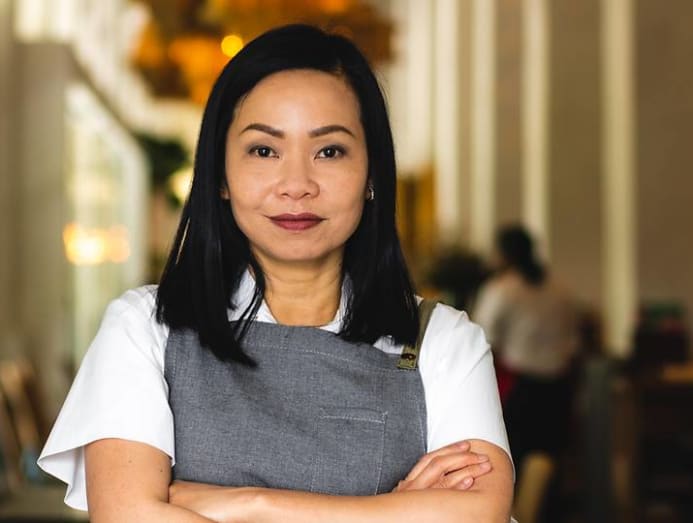
Ironically, for that reason, the purity and diversity of its flavours is also at risk. “When I first felt like I wanted to learn how to cook, I thought, ‘Maybe I’ll learn how to bake, and make tarts and cakes and French desserts and fancy things,’” she recounted. “We just sort of take it for granted that, ‘If I still want Thai food, it’s still going to be there for me.’ It might still be there, but the flavour will be different. For example, it will be someone else’s chilli jam, and not my grandmother’s. So, if you have a grandmother who makes something amazing, please learn how to do it, because even though someone else is doing that dish, it’s not going to be the same.”
READ: The old family recipes that let Shang Palace’s chef take fine Chinese cuisine into the future
A NEW STORY
Pim has been sharing her grandmother’s recipes with people in San Francisco, where she’s lived most of her life, since she opened the Michelin-starred Kin Khao in 2014; before that, her food blog Chez Pim, hailed by The Guardian as one of the most influential, had steadily gained fans and followers. The 48-year-old was once a Silicon Valley executive, but now divides her time between two continents, running two high profile restaurants.
Some might say that taking over the kitchen of Nahm, a restaurant so synonymous with the name of David Thompson, was a brave move.
“Of course, there’s quite a big legacy to step into, but I feel like I have my own story to tell about Thai food. I have my own point of view,” she said. “And no matter what field you work in, if you’re coming into somewhere new, you’re always working under someone’s shadow. But I’m not afraid of working my way out of it.”
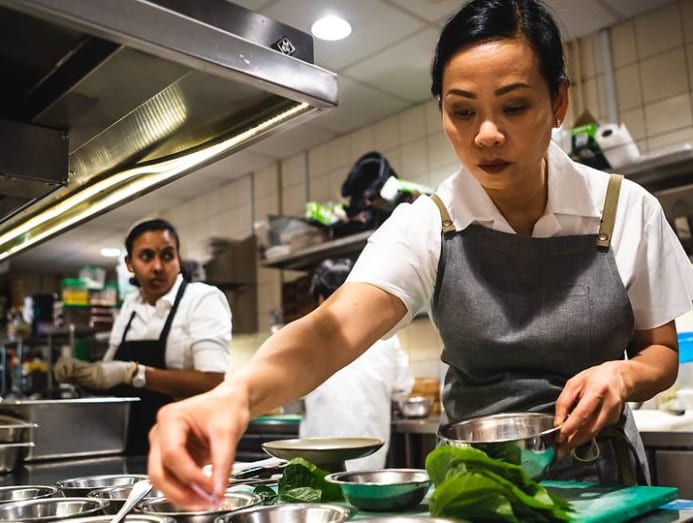
What is the story she feels compelled to tell? “To me, Thai food is something so close to Thai women. This is what we’ve been doing for generations. This is what we’ve been cooking for our families, nurturing our families, and also passing on this heritage that’s ours – our cuisine, our food, the flavours that we know, the flavours that we grew up eating and cooking. These are the things that I learned growing up and that’s my story to tell,” she said. “I feel like I’m a link in that long chain of Thai women – just cooking what I know, learning more about Thai food from generations before, and then passing it on to the next generation.”
Although Thompson can be credited with exposing Thai cuisine to the global fine dining scene, it’s hard not to see Pim’s takeover as a decolonisation of sorts, especially from an Asian perspective.
But “reclaiming” Thai cuisine is not the word she would use, Pim said. “I just think it’s always been with us. To me, Thai food has never left the hands of Thai women. It’s always been in our hands and I’m just doing it. This is my time and this is my part. In a way, it’s true in any culture that the work of women, the work in the home, is not really looked upon as something very valuable, right? And so, in some way, I feel like if I can turn the spotlight over that way a little bit more, it’s what I can do.”
At the same time, she’s deliberately working in a direction that strongly supports Thai produce and producers. One of the first things she did in the Nahm kitchen was to question the provenance of the ingredients, even down to the different types of fish sauce.
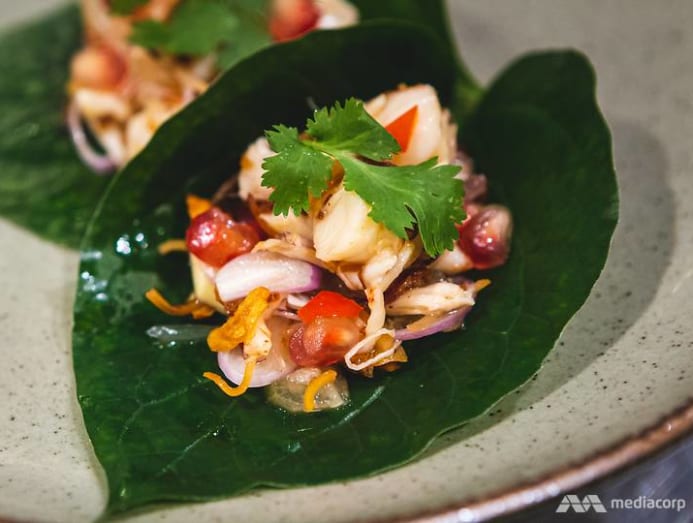
“I really believe that a restaurant is not just a kitchen and a chef cooking. It’s this ecosystem of us supporting small farmers and producers who are doing amazing things,” she said. “Sustainability is very important environmentally of course, and I believe that things taste better when they’re organic – that’s just my own belief – but at the same time, the other side of that sustainable question is that we need to make it sustainable economically for those small farmers and small producers, too. We’re supporting this little old lady who’s still making shrimp paste the way it has been done for a long time – but unless she can sell it at a good price and make a good living, the next generation is not going to continue that art.
“That’s part of my responsibility, I think, in running a restaurant – to look for great producers and support them as best I can, because without those things, I can’t make delicious food. I’m just a cook – I’m not a magician,” she added.
READ: The chef behind Singapore’s No 1 restaurant is now serving food on a plane
“THIS IS NOT THAI FOOD FOR BEGINNERS”
As a champion of traditional Thai flavours, what’s one thing Pim would like people to understand better about Thai food?
“That it’s not just Pad Thai and Tom Yam Goong,” she chuckled. “There’s a lot more to it. They are delicious, absolutely, but so many Thai restaurants, especially outside of Thailand, cook the same things; the same dishes we all know and love. I want people to reach a little bit further. There’s so much more to Thai food. When you see something that sounds a little different on the menu, just try it,” she said.
Issuing bold challenges to people has worked in her favour thus far. At Kin Khao in San Francisco, “I put a shrimp paste relish on the menu. It’s like sambal belacan – it’s funky and spicy; it’s got garlic, shrimp paste and a lot of things going on. I put on the menu, ‘This is not Thai food for beginners.’” She laughed. “And we just started selling that dish like crazy, because people were like, ‘I’m not a beginner! I’m going to give it a try!’”
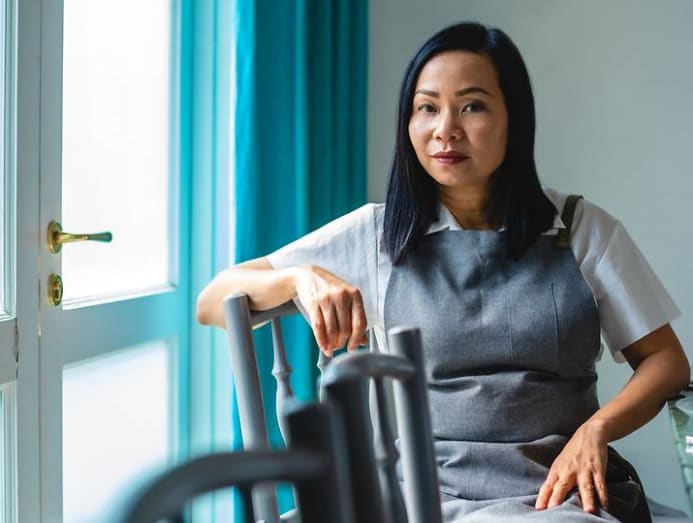
In the kitchen, too, she said, she hopes to guide her cooks in the way of challenging boundaries and changing perceptions. “I’m trying to get them to think a little bit more about the construction of a dish,” she said – for example, in the subtle differences between fish sauces.
Has she had to face criticism in the dining room? “Sure,” she said. “We’re all humans. You read something and it’s not super flattering, and you’re like, ‘Oh, but you didn’t understand me.’ It hurts, but I try not to think about it because ultimately I’m not really cooking for critics. I mean, I wish I knew exactly how to cook food that tastes like two Michelin stars, but I don’t. All I know is, I just need to make something that is honest to my vision of that dish.”
A LINK IN THE CHAIN
For Pim, being honest has a lot to do with staying true to her roots. Much of her philosophy when it comes to cooking has been shaped by growing up in a family where her grandmother and aunts were dedicated to making food from scratch, such as chilli jam, which, even among Thai people, is often storebought, she said.
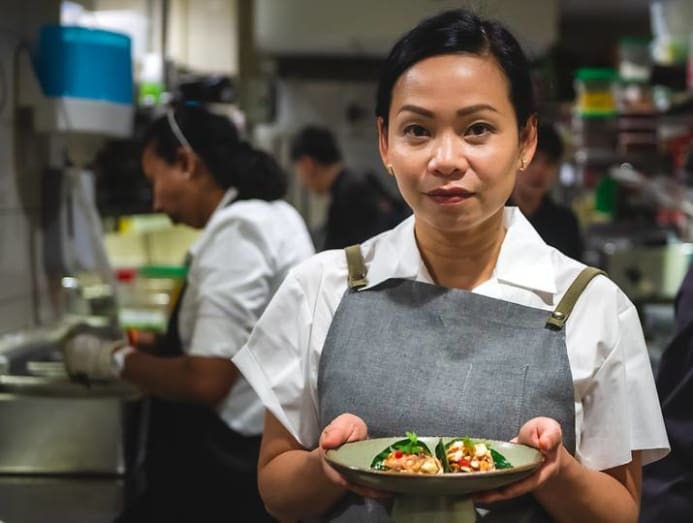
“When I was still in school abroad, every summer, I’d come home and take a big jar of chilli jam in a Nescafe bottle back with me, I’d treasure it and never share it with anyone and ration it carefully until I could get home the next year,” she chuckled.
“Then I realised that unless I learnt how to make it, it was going to go away, and I wasn’t going to find that flavour again.”
That was what started her on her journey of food. By that time, her grandmother was already gone, but her eldest aunt guided her in the kitchen.
Her aunt now has Alzheimer’s, she shared, recounting a hospital visit a few years ago. Her aunt remembered her as a child of 12 and thought she had just come home from school. “This was two years after I opened Kin Khao, and I was showing her food from Kin Khao, because we had just had a story in the New York Times. She looked at the photos and said, ‘Oh, chilli jam. You know, we don’t buy that. You have to make it.’ I was like, ‘I know, I made that.’ And she was like, ‘Really? You know how to make that? Who taught you?’ And I was like, ‘You did.’”
Wiping her eyes, Pim said, “I feel like I’m doing my part.”





